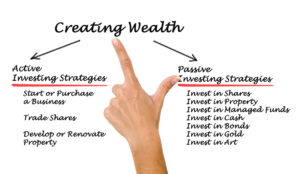 After I did the first couple of blog posts about insights I’d gleaned from David Swensen’s wonderful book, “Pioneering Portfolio Management,” I thought I was done.
After I did the first couple of blog posts about insights I’d gleaned from David Swensen’s wonderful book, “Pioneering Portfolio Management,” I thought I was done.
But a few days later, a conversation about the book with an entrepreneur made me realize Swensen also perhaps unintentionally provides some really useful information about why entrepreneurs (including executives and small business owners) shouldn’t be active investors. Because Swensen’s insights make so much sense, I want to share them here with you..
Er, don’t worry. This will be quick. And let me just say this: Everything I say here applies to me too.
Entrepreneurs Have Wrong Mindset for Active Investing
A first interesting point—which makes more sense the more I ponder it.
Are you an entrepreneur? Or a small business owner? Or a senior executive? Okay good, you’re who I’m talking to here.
You know that mindset you have where if you encounter something that works, you do more that? And if you find yourself losing at some activity, you cut your losses?
That “let your winner run and kill off your losers” mind-set is exactly the wrong way to approach active investing.
This approach—which in active investing is called momentum investing—results regularly in you buying high and selling low.
Swensen, in his classic book “Pioneering Portfolio Management,” talks about this mindset mismatch when he describes how executives on the Yale Investments Office’s oversight committee think the wrong way about investing successes and investing failures. The core problem is that these executives have the wrong “momentum-based” mindset. They are professionally programmed to stop doing what doesn’t work and then double-down on what is working.
Successfully active investors need to do the opposite. Success active investors are contrarians. They need to sell off their recent winners and then double-down on the losers since the today’s winners become tomorrow’s losers and today’s losers become tomorrow’s winners.
Entrepreneurs Already Earn an Alpha Return
A quick related point: Entrepreneurs, including senior executives and small business owners, also don’t need to reach for an extra return from active investment.
The reason I suggest this? You probably already have a great way to earn a generous alpha return if you’ve got a stake in some entrepreneurial venture (including ownership of a small business, direct real estate investments, or equity based executive compensation.)
In other words (and see if this sounds familiar) you know that mindset you have where if you encounter something that works, you do more of that? And if you find yourself losing at some activity, you cut your losses?
That “let your winners run and kill off your losers” mind-set is exactly the right way to approach entrepreneurship. In business and in entrepreneurship, a “momentum-based” mindset is the route to riches.
Entrepreneurs Can Easily Invest Passively
A final, subtle point: The one thing about passive investing as compared to active investing is that passive investing is easy and scalable. Which are great qualities if you’re already busy with another venture.
If you go passive and just select a handful of cheap index funds, you don’t need any particular expertise to invest even large sums.
Note: As I’ve noted in a bunch of blog posts over the years, I personally use the passive investment approach suggested by Swensen in his other investing book, “Unconventional Success.” That approach plops 30% of someone’s savings into a US stock market index fund, 15% (each) into a developed international stock market fund, a REIT index fund, an intermediate treasury bond fund, and an inflation protected treasury bond index fund, and then 10% into an emerging international stock markets fund.
And with a passive investing approach, you’ll beat (because of your low costs) most active investors and with very very modest work. Thus leaving you time to do what you do best… which is creating or running a business.
Related Posts You Might Find Interesting
Index Funds and Asset Allocation Even Better for the Wealthy?
Applying the Logic of Asset Allocation to Your Small Business
Financial Planning for the Top One Percent
David Swensen’s Tips for Active Investors
Great insight. I’m an entrepreneur and a wannabe active investor. When I create my dream portfolio, I always seem to target stocks or funds that have had the best 1-year (or YTD, or whatever length) return, figuring that if it’s done so well in the near past, it will continue to do so. And you’re right – I tend to buy high and sell low.
The problem is, when a stock or fund is low, how to know if it’s going to go even lower, or if it’s poised to start a climb? Big conundrum.
Good food for thought, though.